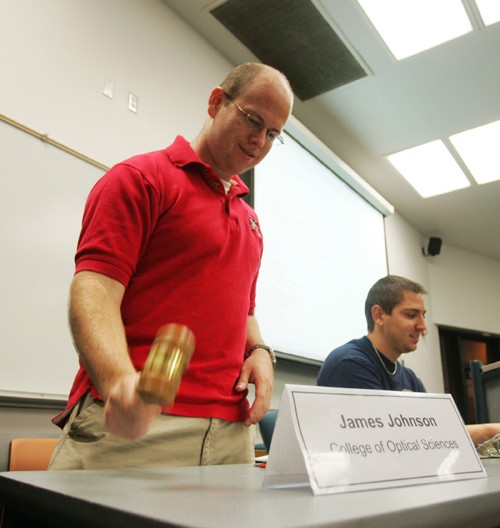Update:
UA President Robert Shelton agreed to a special meeting with the
Graduate Professional Student Council after the body forwarded a
letter to the president’s office detailing the group’s concerns.
The letter, which was sent after GPSC’s Sept. 16 meeting, identified
the following issues as priorities for GPSC.
1. 100% tuition remission for GAT’s
2. No reduction in health care benefits for GAT’s
3. Enact a binding Graduate Student Bill of Rights, discussion with the office of the general counsel to begin immediately.
Shelton agreed to meet with GPSC either Sunday or Monday to discuss
these issues.
———
The Graduate and Professional Student Council, at its meeting last night, proposed the possibility of a graduate student walkout that could take place as early as next week.
GPSC representatives expressed serious concerns over budget cuts and discussed ways to address these issues. The council focused its discussion on ways to prevent graduate student teachers from being subjected to further layoffs and benefit losses.
In order to protect the benefits graduate student teachers currently enjoy — which include a stipend and tuition remission — and to raise awareness about their contribution to the university, the GPSC discussed possible ways to express their grievances to the administration.
Several members of the GPSC put forward the idea of participating in a university-wide walkout on Sept. 24. Jim Collins, a non-degree seeking member of GPSC, said the value of graduate student teachers has to be communicated to the undergraduate student body.
However, GPSC President David Talenfeld cautioned against any hasty actions.
“”While a variety of opinions have been expressed, I personally feel that the walkout would be detrimental to the educational mission of the university,”” Talenfeld told the Daily Wildcat. “”I remain committed to working constructively with all stakeholders. “”
The council did not reach a clear consensus on whether or not to participate in a classroom walkout. However, GPSC formulated a list of grievances they want university administrators to address.
Spanish doctoral student Lucy Blaney said the valuable contributions of graduate student teachers are being overlooked by the administration.
“”A lot of the teaching colleges’ revenues are skimmed off and go to administrative costs,”” said Blaney. “”I don’t want to lose employee benefits so the university can save $500 a month.””
A possible course of action discussed was to present to the administration statistics illustrating the number of credit hours that graduate students teach at the university.
However, other members pointed out that if the money is not there then it would be better to work with college deans and the president’s office to formulate a solution.
Bryan Korth, a graduate student in the College of Sciences, said the college deans are willing to discuss budget issues with students. Considering the small likelihood of getting a meeting with the president or provost, he said, it would be more productive to work with college deans outside of the administration.
The council came up with three main grievances that they plan to send to the president’s office in the form of a letter. These included formulating a bill of rights to protect the employee benefits of graduate student teachers, and maintaining current health benefits and current levels of tuition remission.
While many other issues were addressed, Talenfeld cautioned against coming up with a plan of action that touched on too many issues.
“”We need to go to the university with a very specific list of demands rather than a sweeping indictment,”” he said.
In addition to GPSC’s main grievances, some graduate students at the meeting were concerned that the administration is biased in favor of research-based units when it comes to funding. “”We are a public university and our focus should be on undergraduate education,”” said Collins.
However, others pointed out that the university’s good name is based on research. “”We have top scientists, not top students,”” said engineering graduate student Brenda Gonzalez. “”We made our name on the fact that we are a research university.””









